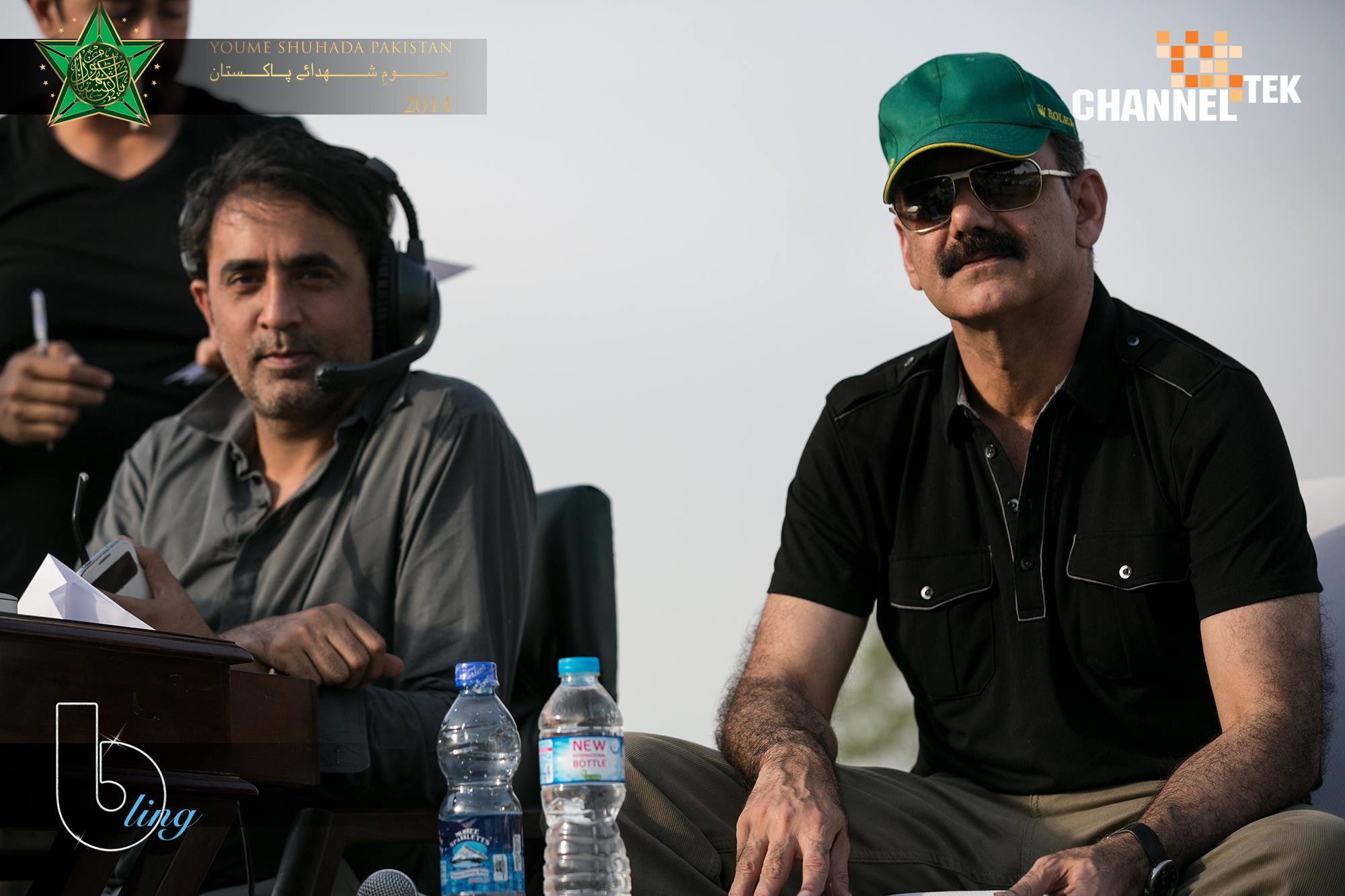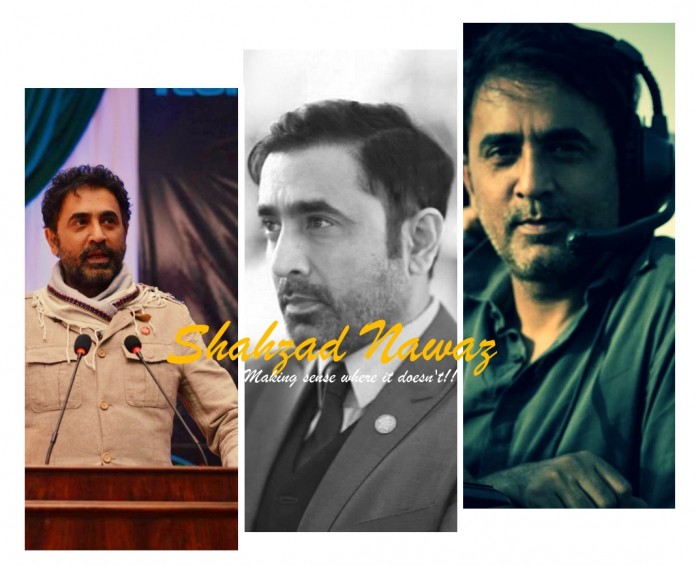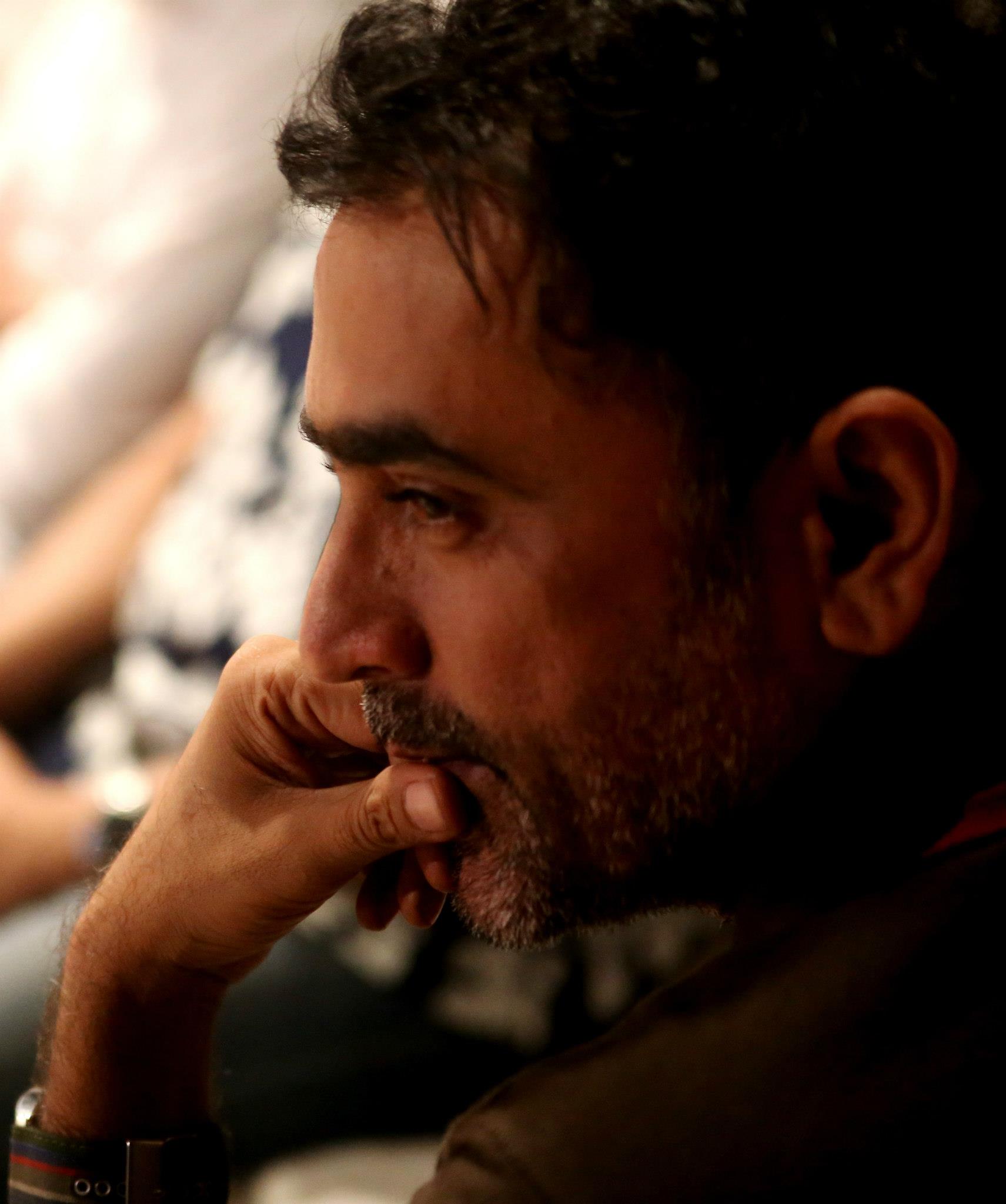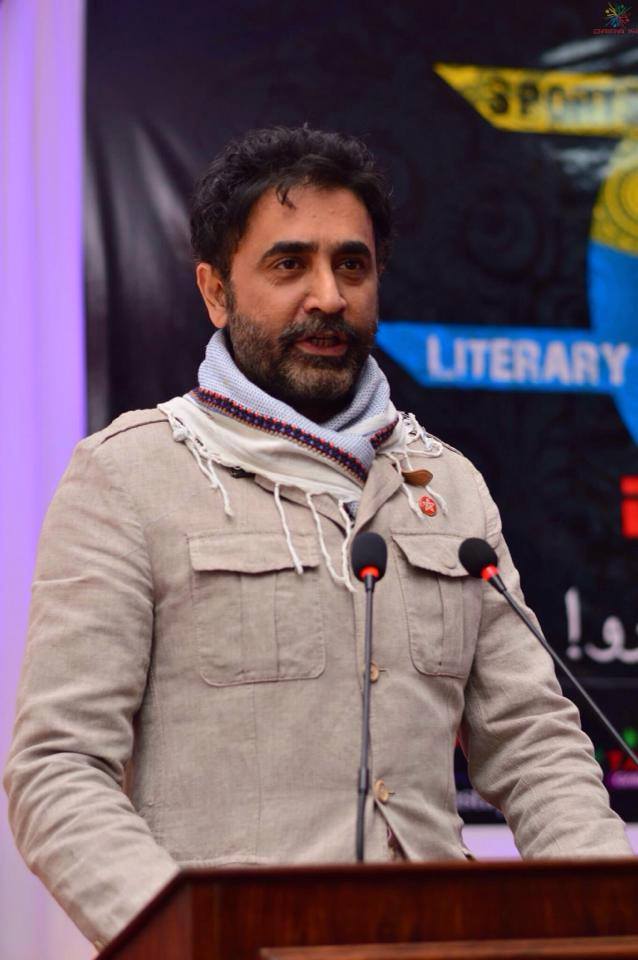By: Aayan Mirza
‘It must be something about his new movie,’ I thought when I didn’t receive the answers to the questions I had prepared for this interview. And it was, it was about his next film. It was only when the anxiousness started biting us off that I thought of contacting Shahzad for final…and there he told me, he told me he was busy with his new film, showed me a thick, blue binding of the final version of the screenplay he had just completed an hour ago. Five in the morning the same day, he sat with me on Skype and we finally did the interview. Here it is.
The start came naturally, I have been following Shahzad Nawaz for quite some time now, as far as his television appearances are concerned at least, although he later told me I hadn’t been following him enough in response to a particular question. Anyway, it is his title of ‘Change artist’ that has always intrigued me, I asked him to shed a little light on it, asked him whether he considered himself a revolution agent in Pakistan Film industry?
“Look there are two three things.” He said as he started. “And I will answer you accordingly, the basic thing is, if you don’t know yourself, if you don’t recognise who you are at your own level, then I don’t think you would be able to have that cohesion and that persistence and that passion in your soul to survive. So I think if you are needed to invent a terminology in this process of self-discovery or identification, or have to make a description for yourself that doesn’t exist in the time you live in, I don’t think there should be any issue in doing that.”
He moved to the next aspect of his answer and explained me that all he does, all that he represents has one thing inherently common, and that’s the connection of his soul and heart with his work. “Every perspective has its truth, and naturally a good in it, whether I am working in brands, for brands, or doing Art direction, or copy writing, or writing a book, or maybe a couplet, producing a song, managing an event, or producing some strategy, or maybe doing some animation, it really doesn’t matter, there are so many things I do and whatever I do, I put my heart and soul in it, and this give it that change.” He said. “I do it irrespective of any desired or undesired financial quid-pro-quo, that’s what a ‘change artist,’ stands for.”
So we moved on and I pitched in my next question in front of him. I told him I was sick and tired of using words like renaissance and revival for Pakistan film industry, and asked him when the film industry would come out of that phase of dreams and start doing the ‘business as usual.’
“When there will be a business sense existing in this country,” he precisely replied. “When you are sitting in your little boat in the middle of a sea, and you throw your fish net in your pursuit, you end up catching a lot of fish. That’s a catch too you know. But when you have to catch a trout, you wait for hours, hours sitting at some corner of a river with a fishing line, why? Because a trout’s course is against the current. You will have to understand that you will get every weekend a new film when the film infrastructure in Pakistan will start making some business sense. And there is no business sense right now.”
How did he make business sense when he planned Chambaili? “The narrative for me on making the film is not money…To hell with money! I am there for a larger and bigger purpose. Try and understand this.” He said in a pumped up tone. To Shahzad, two hundred cinemas make business sense at this immediate point of time. “That and also a sort of legislation in which as an industry you are supported, and your film gets to have a clean feed distribution for a week, a week at least without any other film launch, rest it should work on its own merit.”
But this is Pakistan and Shahzad was quick to recognise the fact that when there are countless people dying everyday out of injustice and poverty, and the laws already existing for all these poor countrymen are not being done justice with, what does a film industry sell then. Nothing. He doesn’t blame the general audience for this state of detachment from films that exists in Pakistan, he instead blames the old filmmaking lot for this.”It’s their mistake and I won’t defend their mistakes and neither should I, ‘Hukmey Aazan Aap pe Zimmedari hai’. You make bad films, you sell lust and sex, then it is obviously wrong. Look, I as Shahzad Nawaz have a simple formula, I don’t do something or produce a movie that my daughter and sister cannot watch.”
Interviewing him and not asking him about Chambaili would have been an under-service on our part. How could either of us resist touching that aspect. So we talked about it. And we talked on whether he thinks Chambaili did what it was meant to do, because given its apt release right before 2013 general elections, and its subject with a political base, it wasn’t just another one of public’s resort for entertainment.
Shahzad thinks and takes pride in the fact that it timely did what it was supposed to do, but also believes it could do more had Pakistan’s cinema circle been bigger. “It ran in three of our cities, and in these three cities it brought people on roads, I don’t of course claim the whole credit on behalf of Chambaili, but I think if someone says it didn’t play its role, that too would be an injustice.”
“But I also feel disappointed when people consider Chambaili merely an idealistic theory. Chambaili talks about electoral reforms, it talks about biometric voting system, with such a system in place, the common man wins, because in the entire world, in any modern developing country, you need a dynamic, pulsating middle class that is empowered in order to get out of that ‘developing’ status. Empowerment in any country’s social infrastructure is the success of social justice in that country. We didn’t criticise the system in the film, we didn’t talk about changing it anywhere, we talked about empowering its implementation process. Is it idealism? Well, no,” and he quotes the example of India’s Aam Aadmi Party to support his argument.
With that we left that question there and moved on. I took his permission next and asked him about his family. Shahzad has a pretty authentic military family background. His brother is an Air Force martyr, his dad used to wear the white Naval uniform for the country, and he was so close to joining a military college himself. What happened then. How he ended up being in a place where he is today.
Shahzad gives credit to whatever is written in his ‘preserved scriptorium’ for this great contrast in his life. And there is more to this divine aspect of his fate. He considers himself to be here because it had and still has a purpose behind it. “Fighting injustice with whatever His own attribute Allah has blown into my soul, may that attribute be in a very miniscule percentage, and in a very minute form…you see, some are Rahman more, some are jabbar more, the same way, some are Musawwer.” He says in his own words.
The divine side aside, teenage romance and the first love of that sort played a major hand too in shaping up his life. “I was in the ninth grade and I was supposed to join Military College Jhelum to further my academics, I fell in love with this girl, and she asked me not to leave Karachi, I didn’t leave Karachi, but I left my papers blank for her…and failed, else I might have been in fauj today.”
Further revealing about the inheritance of the creative bone in him, he told me that the famous Pakistani poet, also recognised by his title, Shair-e-Pakistan, Sehba Akhtar was his maternal uncle. While his grandfather at the same side of his family was a known playwright, Chaudhry Rehmat. Mother’s side from Jhalandar and Father’s from Chakwal, Shahzad says it brings balance in his overall personality. “My discipline, my belief, my conviction, the way I handle things, my focus and determination to fight out the odds is what runs in my blood. And the creativity, of course, from my mother.”
I later asked him if he ended up marrying that girl, was it a successful first love unlike most of them. “No” he replied, “don’t know where she is,” he said with a smile.
Navigating through the set course, I based my next question on his recent tweets, posts and promotional uploads for Army’s ongoing offensive in NWA. “Isn’t it just too much, are you trying to be the ISPR of ISPR?” I asked him…and soon regretted my decision.

“I don’t think you follow me that well. You have generalised it in your thoughts.” He said, still probably digesting the question. But the air cleared only when he highlighted the part of his life when he was involved in the Judiciary movement a few years back, and played an integral part in it, against then president and Army chief, General Parvez Musharraf.
He also told me that the promotional stuff I was talking about was actually a part of his professional scheme and portfolio that he holds to run his kitchen. “That is my hand’s work, that’s what I do, I am professionally engaged by the people there, I did Youm-e-Shuhada recently, did last year’s 6th September, doing the Azadi Parade this 14th August, will be part of the 6th September this year, and it’s all strictly professional.”
But in the same breath he also told me that he will stand with Pakistan Army on any given Sunday, and that he doesn’t shy away in his support for the armed forces of this country, his fight against individuals involved in wrongdoings, however, will live on.
Keeping the Fauji element alive in the interview, and that of his profession, I next asked him when would I see a coup film produced action-thriller with Shahzad Nawaz probably wearing Army’s operational camouflage, flying away in its choppers, for an ever important mission for the country?
“It’s a nice thought, I respect what you say. I can’t predict the future, but yeah, it can be a possibility. You never know what future holds for you.” Interestingly, Shahzad also shared that there were two song videos for Youm-e-Shuhada he was approached for. One of them was Shahzad Roy’s song for the event. Couldn’t materialise at the end because of his other engagements at the event. But for the other song, Shahzad said, “It didn’t ran on TV, but I played a Major General in it.”
“I don’t plan anything, maybe I should.’ He said trying to shape up his answer more Shahzad Nawaz way. “See there was this film I was working on for last eight months after Chambaili, eight months and then I went to London a month and a half back for it’s production deal, was very excited, very convinced that this is the project I had to do, and I will still do it. So I finalised it, was coming back, right there in the flight, another idea hit my mind. Took a 180 degree turn and decided that this new idea is what needed to be done earlier. Since then with an override purpose, I am on it, day and night, just completed the final draft of it’s second screenplay today.” He was quick to add that it may not necessarily be a military film, ” Then they will say it’s another Waar, that’s a problem too here you know, I believe it should be about the country in general, and that covers everything I guess.”
We proceeded with the interview on that very point, and I next asked him about the role of UPA in Pakistan. I asked him why all these producers at UPA want everything foreign in our country banned, and why don’t they instead go and fight on the grounds of merit.
“A wrong cannot be branded right.” He spoke in a humble tone. “If there is a bad content running on your TV, I agree with you, it’s bad. In fact, I would confess it here, I don’t even watch our entertainment channels because of the same reason, and this I say holding the top seat in UPA.” He further cleared that he is just there till Eid mainly.
Adding to his reply, he told me that he has neither produced a drama for TV yet, nor will he, till there is something that redefines the genre all together. His fight is also against the rating system of this country by the way.
That being said, Shahzad defended UPA’s role clearly. “UPA doesn’t say ban the foreign content altogether, it calls for the enforcement of the laws that PEMRA and the people of this country have made. That law gives the foreign content a space of 10 percent in twenty-four hours for all the channels, additionally, the Indian content in that space is 6 percent of that ten previously defined. UPA says, first, enforce the law, and secondly, define the lacuna in that ten percent policy, as it doesn’t say anywhere that all of it should be run in your 7-10 PM prime time slot. This leaves Pakistani content merely 20 minutes in it, in its own country. What in it has got to do with open competition?… That’s what UPA demands, nothing else.”
Relatedly, I further asked him about the role of producers in all this. I asked him why do we only get to see the same run of the mill ‘Saas-bahu’ content on our screens. Isn’t our content already bad in its nature that it doesn’t qualify for that coveted prime-time slot at first place.
To this he explained me the mechanics of how it works in the industry. “A channel calls you, and it gives you a script to produce a serial on. You are just the manufacturing unit there, they give you the budget, the cast and everything. And you are merely an executioner there, the producer of this country.” Shahzad in the same breath also condemned the producers who accept that subservience, “If you ask me, they shouldn’t do it. I don’t, at least.”
Similarly, he also condemned the bad content that runs on the channel otherwise, be it foreign, local or anything. “Why do they screen that bad content, nobody has got a gun on them. Why then? Because it is cheap, costs less and you don’t have to think much for it. It has run all over the world, they buy it, dub it and run it in cheap on your screens. How do you expect the original Pakistani content to compete with that?” He asked in a heavy voice. Further, Shahzad asked me if the locally produced comedy content makes me laugh, I honestly and obviously replied with a negatory expression, “then do you think it makes the content head of that channel laugh,” my reply was the same, “then why the hell he still runs it, he knows it doesn’t make you laugh, they don’t care, he runs it because it’s a business decision, an economic consideration, it saves him 150,000 on a two hundred thousand figure, just an example.”
We discussed that bit a little more and then we moved on to the last bit of our interview. I asked him the answers of questions sent to us by his fans on our Facebook page.
The first one in that came from Jamil Aurakzai, and he asked about the two projects that were announced by him after Chambaili; namely, the Holy Rebel and Danki.
“Well, we released Chambaili in April last year, but it didn’t end here for us of course, we went to festivals after that, international releases, UK just two and a half months back. Then I had tours and travels after that, so I am just a human being at the end of the day, not a machine. But as I told you,” he waved the compiled final version of his next project’s screenplay, “here it is, I am done with the work, it’s an all new project. You have seen cast and crew calls already on our Facebook presence and let me break this news from this platform of yours, March 20th is the date I give you, you will be in cinemas watching it that day, so you are the first ones to carry this news and I have given my word now. And I am a person who binds himself through unconventional means, be it through the graphical aid, or the way I just did, because the money doesn’t bind me.
Moreover I asked him about the standing of Holy Rebel as of now.
Holy Rebel is a huge project you know, it’s an epic. It will take time. It cannot be made this way, and shouldn’t be at all. there is cultural research going on currently on it, for last six months now. We are studying it all in detail, the architecture of that era, history, clothes, shoes, swords, Afghans, Sikhs, Hindus, Punjabi Muslims, the governor of Kasur of that time, Bulleh Shah’s own history, and this you should know that around sixty percent of Bulleh Shah’s history is unknown to mankind. So it takes a lot of research. Bulleh Shah’s poetry, which poetry, the purpose behind it, it’s background, so mapping it all is a herculean task. But we are on it, with last six to eight months already served on the same thing.
Related to the casting call you just talked about, let me ask you. Why all the new people?
“A lot of people contact me from time to time to provide them a chance in my projects, and I never refuse any of them, I always tell them that whenever I would do my next project, I will make it public, and I will invite them to showcase their talent. They all deserve that and why shouldn’t they. Why should I give only the established people the chance, going by that theory, most of the people in Chambili were new too. Why shouldn’t I train new people, at the end of the day it will help this same industry, so why not?
Shahzad answered the next two questions in the same go. Mahi Fato asked him about Chambaili’s release in UAE, while another question from a separate fan inquired about the DVD release of it.
“The answer to the question of its UAE release, and please mention it when you publish, probably never. Geo Films originally had the rights to release the film internationally, but they failed as our distributors abroad. So we bought those rights back from Geo films, and released it in UK on our own, that too because there was a party interested there. If such an arrangement is made, then great. Otherwise, I think she should wait for the DVD that comes very soon in the market.
Ahmed Sarym asked about your future plans.
Well, as I said earlier, may Allah give me health and strength that I finally move towards my next project. But I can’t really say much about it, and I just don’t think that way. When I don’t know the next second of my life, when I can’t talk about my next minute, how can I answer about my future plans. I am not a clairvoyant, I cannot see beyond time, about present, I have just told you, and Allah willing, I will bring my next out on time with all the support of you people, fans and my well wishers.
Towards the very end, I requested him for his final comments, for readers, for fans, for all of us.
I think…and it’s quite relevant, just pray for Gaza, for those who cannot defend themselves, and I pity all those, and I want them to pity as well, who cannot raise just one, single voice. When all it takes is one little word, and that’s the least one could have done, we are not even doing that, and this goes to all my leaders. so I hope sense prevails, and I hope there is peace. My heart goes out to people in Gaza.
With that relevant, thoughtful comment, we came to the end of this extensive, candid interview session. I hope you all liked it.






